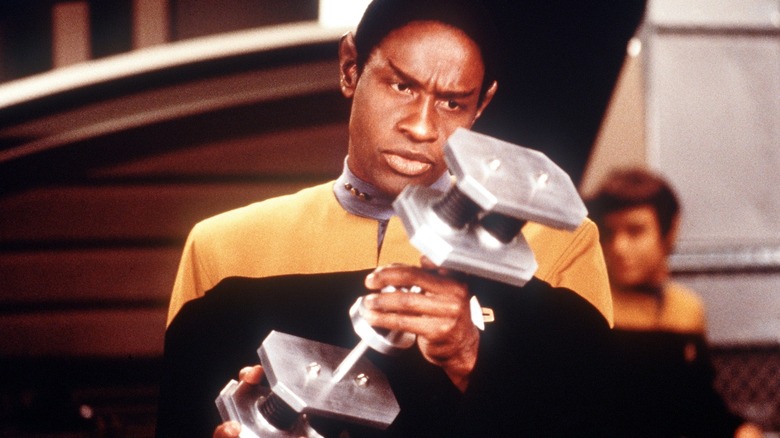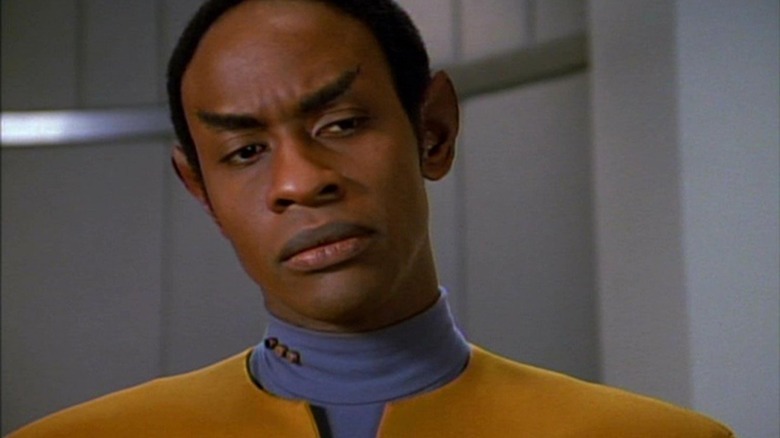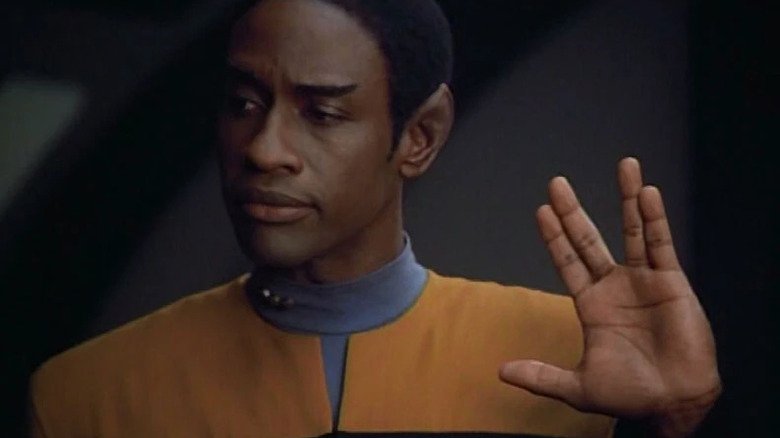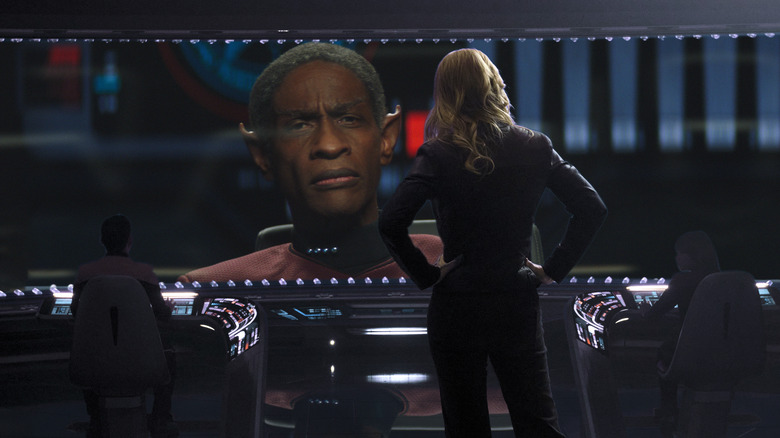Sorry, Spock: Tuvok Is Star Trek's Best Vulcan
The question has been asked in the pages of /Film in the past: do you prefer Spock when he remains cold and logical in extreme scenarios, or do you prefer him when he cracks and shows elements of his humanity?
Many Trekkies say they prefer the latter. Spock, half-human and half-Vulcan, was the eerie alien "Star Trek" character that initially served as the most intriguing element of the 1960s TV series. Sporting his Mephistophelean ears and chilly demeanor, Spock was the peculiar outsider on a starship populated by humans, the clear sign that "Star Trek" was indeed an otherworldly sci-fi series. It seems, however, that show creator Gene Roddenberry wasn't comfortable including a full-on alien on his program — perhaps that would have been too, well, alien — and elected to give the character inner drama. Hence his human lineage. Spock could be torn between two worlds, constantly wrestling with his human impulses while communicating his Vulcan-ness.
Personally, I always like Spock better when he retained his composure, keeping his human impulses in check and reacting to the world logically and directly. Spock's logical responses may serve as aspirational moments for viewers seeking examples of calm, as well as provide a dramatic counterpoint to the all-too-panicky humans around him. Spock's occasional departures into human-like madness interrupted that logical idyll.
But you know who never cracks? Who never had a human side to wrestle with? Who more purely represented Vulcan ideology, even on a ship populated by mostly humans? Tuvok (Tim Russ) from "Star Trek: Voyager." Tuvok, the first main-cast Vulcan on "Star Trek" since Spock, is, unambiguously, the best Vulcan in the franchise. He is, at the very least, the best at being a Vulcan.
Most logical
Notably, Tuvok was unencumbered by personal drama and was permitted to merely be who he was. It was often exhilarating to watch. Importantly, Tuvok also served as a steadying presence on a ship that repeatedly faced extreme scenarios. In the pilot episode, the U.S.S. Voyager was flung clear across the galaxy by an all-power entity called the Caretaker. When the Caretaker died, the Voyager was left stranded some 70 years from Earth. Many found themselves needing to adjust to the idea of a very long car trip home. Tuvok, meanwhile, took everything in stride. He was refreshingly calm.
Tuvok served as the chief security officer on the U.S.S. Voyager under Captain Janeway (Kate Mulgrew). As a security officer, Tuvok knew when to be stern with potential criminals. His logical mind allowed him to seek out matters of safety as calmly as possible. Tuvok was often suspicious of newcomers, but his suspicion was a means of staying prepared; he never gave in to mere paranoia or xenophobia. Working as a security officer also allowed Tuvok to develop a rapport with other, more emotional beings, coming to understand their impulses and reactions intimately. Tuvok may not have lived by emotional tenets, but he wasn't constantly baffled by human reactions to things.
Spock, as the science officer on the U.S.S. Enterprise, always had a "safety net," as it were. If he was ever perplexed by humans, he could vanish into research and calculations. Math was a handy, professional friend for Spock. Tuvok, while still staggeringly intelligent and scientifically minded, was far more adaptable. His mind was devoted to a litany of criminals and the crimes of passion they may commit. Tuvok understood people. Spock didn't gain that ability until his old age ... and until after he had died once.
Why did they wait so long?
None of this is to say that Tuvok did not have personal drama. As established by the original series, Vulcans experience a powerful, violent mating urge once every seven years called Pon Farr. Tuvok, stranded thousands of lightyears from Earth, found himself going through Pon Farr in the episode "Body and Soul" (November 15, 2000). Tuvok needed to mate but was stranded very far from his wife, to whom he wanted to remain faithful. Although Tuvok considered it immensely gauche, he followed the advice of Tom Paris (Robert Duncan McNeill) and recreated his wife on the Voyager's holodeck. Note that this story was not about Tuvok's inner conflicts pertaining to his Vulcan-ness. Indeed, it was about how his Vulcan-ness was important to retain. "Voyager" was more respectful of Tuvok's Vulcan heritage than the original "Star Trek" was to Spock's.
Indeed, Spock was often the butt of racism and ignorance. Dr. McCoy (DeForest Kelley) frequently made disparaging comments about Spock's behavior and physiology. A lot of McCoy's language was pretty hard, and sounds to the modern ear like downright bigotry. McCoy, I feel, was meant to give a voice to "Star Trek" viewers who were a little put off by Spock's alien behavior, as well as give Kirk (William Shatner) a chance to click his tongue at his doctor's backward worldview. Sadly, that meant Spock had to bear the brunt of racism on the regular.
Tuvok experienced no such prejudices. When Tuvok needed an emotional counterpoint, the "Voyager" writers paired him with Neelix (Ethan Phillips), the jolly, hobbit-like character. Tuvok was quiet and dignified, and Neelix was jovial, chatty, and pushy. Their Abbott-and-Costello dynamic was rarely funny, but it was ... well, it was a logical writing choice.
Tuvok's long life
With the Tuvok/Neelix dynamic in play, one can kind of see — kind of — why the "Voyager" writers conceived of Tuvix (Tom Wright), a hybrid character that emerged when Tuvok and Neelix were accidentally combined in the ship's transporter. It was a goofy idea, to say the least. To this day, Tuvix remains something of a punchline among Trekkies.
Spock was written at a time when lore about Vulcans and their culture was still being invented. Tuvok, meanwhile, was invented nearly 30 years later, when Vuclans had already been known for a while. As such, the character, as well as Tim Russ, benefitted from a more solid groundwork of extant lore. As such, among other things, Tuvok's actual age was considered. Vulcans are incredibly long-lived, and in the episode "Flashback" (September 11, 1996), it was revealed that Tuvok once served on board the U.S.S. Excelsior, the ship captained by Captain Sulu (George Takei) in "Star Trek VI: The Undiscovered Country." In that episode, Tuvok said that he was a mere lad of 29. That film was set in 2293, so Tuvok was born in 2264. By "Voyager," Tuvok was about 112, a secret he kept closely guarded from everyone but his captain. This kind of detail allowed Tuvok to emerge as more fully formed than Spock.
More recently, Tuvok appeared on an episode of "Picard" as well ... Or did he?
Other Vulcans came along from time to time throughout "Star Trek," of course, but they were either supporting players (Mark Lenard's Sarek, Kirstie Alley's half-Romulan Saavik, Kim Cattrall's Valeris, Alexander Enberg's Ensign Taurik) or lived in a different era when Vulcan lore had to be reinvented (Jolene Blalock's T'Pol on "Star Trek: Enterprise").
When it came to presenting a pure, clean, straight-up Vulcan, Tuvok was the beginning and the end.



